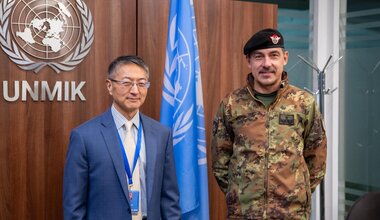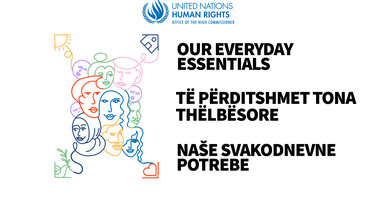6 Feb
2015
UNMIK Chief briefs UN Security Council on Kosovo
UNMIK chief briefs UN Security Council on Kosovo
6 February 2015 - Statement by the Special Representative of the Secretary-General (SRSG) in Kosovo, Farid Zarif, to the United Nations Security Council:
Mr. President, Excellencies,
This Council meets today at a key juncture of Kosovo’s history. Last December, after a prolonged political impasse, a new Kosovo government was formed as a result of an alliance between the Democratic Party of Kosovo and the Democratic League of Kosovo. The new government, led by Prime Minister Isa Mustafa, declared its commitment to economic reforms, strengthening the rule of law, European and Euro-Atlantic integration, and a continued dialogue with Belgrade.
Over the past weeks, however, the government had to focus on responding to public protests in Pristina on 24 and 27 January, involving up to 7,000 people, which turned violent and caused injuries and destruction of public and private property. These protests were largely organised by the opposition movement “Vetevendosje” (“Self-Determination!”) to demand the dismissal of a Kosovo Serb Minister for Communities and Returns for the controversial remarks attributed to him in reaction to the protest in Gjakovë/Ðakovica against visiting Serbian internally displaced persons on the occasion of the Orthodox Christmas on 6 January. The protesters also demanded the reversal of the government’s decision to withdraw a draft law concerning the transformation of one of the largest industrial entities – Trepca Mines – into a publicly-owned enterprise. In addition, the protests appear to have been fuelled by a lingering wider public discontent with the economic situation and a drastic increase in the migration of people out of Kosovo in recent months. The 27 January protest was particularly violent and resulted in more than 50 protesters and 100 police officers seeking medical assistance. Some 160 persons were arrested and most of them subsequently released, including the mayor of Pristina, a leader of the “Self-Determination!” movement.
While peaceful protest is an essential right, criminal violence and vandalism which accompanied the protests on the 24 and 27 January are deplorable. Employing such methods in the guise of pressing for any particular political change or agenda is nothing less than a backward-looking choice - backwards from the voters’ aspirations expressed in the elections of last June which were organized throughout Kosovo under a single legal framework.
I commend the prompt and unequivocal public condemnation of these acts by responsible political and civil society leaders in Kosovo. In this context, I wish to acknowledge the decision of some political parties, unions and civil society organisations to publicly distance themselves from the violent acts that took place during the demonstrations. Unfortunately, however, a small number of other political figures, mostly from the opposition, attempted to exploit the situation and deflect their own responsibility for what happened. While the Kosovo police had to resort to the use of tear gas and water cannons, its response was professional and proportional in the face of determined attempts by some elements amongst the protesters to assault the main government building, including by throwing stones and petrol bombs at the buildings and those who were protecting them.
In this context, I appreciate the efforts made by leaders both in Pristina and Belgrade to restrain political acrimony surrounding the highly complex matter related to the future of the Trepca mining enterprise. I hope that a similarly measured approach will be adopted by all sides with regards to the dismissal of the Kosovo Serb Minister for Communities and Returns on 3 February. The new government’s stated objectives and resolve to undertake the serious work required at this critical juncture should not be undermined by such short-term challenges.
Despite these developments in Pristina, leaders in both Belgrade and Pristina are determined to continue with their high-level dialogue, which will be resumed next Monday, 9 February, in Brussels. In fact, those who initialled the “First Agreement of Principles” in April 2013, Mr. Dacic and Mr. Thaci, are with you in this Council’s chamber today. I urge both to continue to be active supporters of full implementation of the agreed provisions, and of making further tough core decisions that are required for the comprehensive normalisation of relations.
From its inception, the EU-facilitated dialogue has been about making hard choices; between the past and the future, between stagnation and progress, and between consolidating political power and doing what is in the best interest of all people in the region. The meeting on 9 February presents an opportunity to reaffirm the commitment to a constructive and purposeful dialogue, with a view to shaping a better future for all affected communities in the region. I welcome therefore renewed statements of determination by both Belgrade and Pristina to resolve outstanding differences concerning implementation of the existing agreements. In this context, I wish to highlight the need for the Kosovo government’s early commitment to the establishment of the Association/Community of Serb-majority municipalities during the coming period. This is one of the core provisions of the April 2013 Agreement. I also hope that the relations between Belgrade and Pristina will delve into new important areas, as the next round of the dialogue unfolds.
Both the new Kosovo Assembly and the new coalition government in Pristina have demonstrated sensible choices in their priorities, and appear to be acting apace. The formation by the government of a technical team tasked with preparing the necessary legislation for the establishment of the specialist court is critical. I add my own voice to many others in the international community who have urged the Assembly and the government to move swiftly to complete all the required steps, given the fundamental importance of this issue for justice and reconciliation in Kosovo.
The new government has taken early and prudent steps on some other immediate priorities, such as planning viable economic development and enhancing the rule of law. Both are essential to creating new and equal opportunities for all, and to building confidence in public institutions to promote good governance and protect the rights of all.
I also applaud the swift action by the Kosovo Assembly in considering a draft law criminalising participation in armed conflicts outside Kosovo. I urge further consideration of the draft in consultation with the concerned representatives of the international community. Kosovo security institutions have already taken active steps by arresting dozens of terror suspects and confiscating weapons and ammunition, and this legislation will help provide a more tailored legal framework for handling the problem in the future. As ever, however, it should be recognized that law enforcement measures alone are not sufficient to address the phenomenon in question. The continuous engagement of both political and religious community leaders is vital to deterring youngsters from being lured into violent extremist movements. I note with appreciation that such work is already ongoing.
I welcome the government’s commitment to address the root causes of social inequality and high unemployment in Kosovo, but am also alarmed at the growing numbers of irregular illegal migrants to Western Europe. Many of the issues I have highlighted here trace their roots to a widely perceived dearth of economic and social prospects, especially among Kosovo’s youth. In this respect, I note the steps taken by the Kosovo authorities in recent days, including the establishment of an Executive Commission to carry out an analysis of unpaid debts and review the possibility of debt forgiveness, the Kosovo Assembly resolution proposing - inter alia - the creation of a special fund for preventing irregular migration, as well as President Jahjaga’s and Prime Minister Mustafa’s initiative to engage both the government and international stakeholders in a broader discussion of this troubling issue. I urge the Pristina authorities to proceed judiciously in these matters and continue availing themselves of the many sources of advice the international community can offer.
Mr. President,
Notable progress has been made since my last briefing in respect of the protection and promotion of cultural heritage. The council for the protection of the historic village of Hoçë e Madhe/Velika Hoča was established on 30 January, some two years after the law mandating its creation came into force. Incidents of thefts and vandalism affecting religious sites across Kosovo remain too frequent and demonstrate the need for continuous efforts by the authorities to promote public awareness and appreciation of the value of the rich and diverse cultural heritage of all people in Kosovo. While authorities have made efforts to react to and prevent illegal construction within Special Protective Zones, in particular around the Visoki Decani Monastery, the sensitivity of this matter and its possible impact on inter-community relations should warrant even swifter action by officials. Incidents between visitors of Serbian Orthodox sites and local demonstrators, such as the one that took place on 6 January in Gjakovë,/Ðakovica, need to be addressed through enhanced local dialogue, beyond simple law enforcement measures.
Finally, with regard to progress in the critical process of establishing the fate of missing persons, I urge both sides to muster the political will necessary to bring about a swift closure of the 1655 outstanding cases, in order to help heal the wounds of the conflict and its aftermath, alleviate the grief and suffering of the families, bring the perpetrators to justice, provide compensation to the affected families, and facilitate reconciliation among communities.
Mr. President,
In light of all developments I have discussed today, I trust that the leaders at all levels in both Belgrade and Pristina will courageously embrace their responsibility at this critical moment in the historic process of normalisation of relations and will not shy away from making the often trying choices they are likely to face in the dialogue process.
In conclusion, Mr. President, I wish to express my profound gratitude to the Council members for their support to the work of UNMIK. We will continue working intensively and constructively with our local and international partners in accordance with our mandate.
Thank you very much.
Security Council
 UN
UN United Nations Peacekeeping
United Nations Peacekeeping





